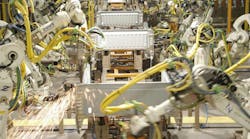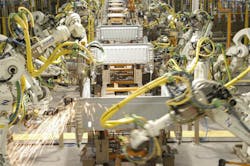But would you consider the automotive manufacturing sector to be burgeoning “hot spot” not only for cyber-criminal activity but for certain types of fraud as well, especially bribery? Well, car-makers sure didn’t top my list of hotbeds for “economic crime” I can tell you.
Yet a global survey by consulting firm PricewaterhouseCoopers (PwC) found that “economic crime” in the automotive industry is on the rise, with 28% respondents to a survey conducted by the firm reporting that their companies experienced an incident of economic crime, up slightly from 25% in 2011.
PwC determined that among the top types of economic crime in the automotive sector, 74% are committed by internal perpetrators, making it the industry with the highest rate of insider crime, with most internal perpetrators were either senior executives (23%) or middle managers (54%).
In terms of the top types of economic crime committed within the automotive sector, PwC found the list included:
- Asset misappropriation (74%)
- Procurement fraud (34%)
- Bribery and corruption (34%)
- Human resources fraud (13%)
- Cybercrime (13%)
"Economic crime results in significant revenue lost as well as impacting employee morale," he stressed. "As the automotive industry continues to do business on a global basis, it becomes even more important to implement a fraud risk management strategy to fight against these types of crimes. When automotive companies invest in emerging markets, these types of crime-fighting tools can help to uncover so called kick-back schemes and unethical vendor selection."
Though cybercrime ranks last in terms of the type of “economic crimes” perpetrated within the automotive industry’s ranks, it plays a huge part in fraud offenses nowadays. In the U.K., for example, seven out of ten scams are now internet-related, according to the National Fraud Intelligence Bureau which is an arm of the City of London Police.
The complex nature of such crimes, however, means that they are not only difficult to combat, but also to detect and understand, noted Veniamin Levtsov, VP of corporate sales and business development at Kaspersky Labs, a global information technology (IT) protection firm – especially for police officers versed in “traditional” crime-stopping methods.
Levtsov noted that one way firms like Kaspersky are trying to help stem the rise in cybercrime is by working more closely with police departments worldwide – noting Kaspersky’s work with the City of London Police as but one example.The lab recently developed a training program to provide London’s police with specific skills and knowledge to identify and resolve cybercrimes – from an individual victim encountering fraud during an online shopping-spree to a business losing big money from a targeted attack.
Coupled with theoretical knowledge, the week-long training program for London’s police allows for a real hands-on experience, teaching vital skills such as inspecting network traffic, analyzing hard-drive images and decompiling malicious software using specialized training tools and methodology, Letsov said.
That training also address the need for businesses to improve fraud reporting, to ensure police services and security agencies have a clear view of the issue, he noted.
"As the complexity of cybercrime constantly increases, it's imperative that the service's knowledge of such threats increases at the same pace," added David Clark, Chief Detective and supervisor of the Economic Crime Directorate for the City of London Police force.
"With over 21,000 computer misuse crimes in the U.K. in the first quarter of 2014, it's clear that people and businesses are at risk and need protecting,” he added. “The U.K .police service needs to be ready to identify these crimes and have the knowledge to tackle … economic crime and enhance our capability for combating fraud and cybercrime nationwide.”
Something to think about on our side of the pond, as cybercrime by its very nature is illicit trans-border activity that can impact any individual or business connected to the internet – trucking companies most definitely included.






